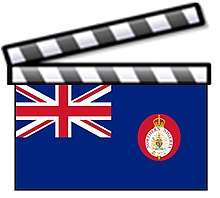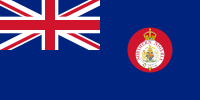Hausa-language cinema
| Hausa-language Cinema | |
|---|---|
 | |
| No. of screens | 150 (2009)[1] |
| • Per capita | ??? |
| Produced feature films (2011) | |
| Fictional | 1000 |
| Number of admissions | |
| Total | 500,000 |
| Culture of Northern Nigeria |
|---|
 |
| History |
|
Literature
|
|
Media |
|
|
The Hausa-language cinema, also known informally as Kannywood is the Hausa-language film industry of Northern Nigeria. It is mainly based in Kano.
Kannywood
Kannywood is the sobriquet for the Hausa language cinema. It is a part of the larger Nigerian cinema, known as Nollywood, which includes other production centres producing films in many other Nigerian languages.
The name "Kannywood" is a portmanteau derived from Kano and Hollywood, the center of the American film industry.
"Kannywood" has origins in the 1990s, when Sunusi Shehu of Tauraruwa Magazine created the term Kannywood and then it became the popular reference term for the industry. The term "Kannywood" was coined in 1999, three years before the term Nollywood came about.[2]
History
The Hausa language cinema slowly evolved from the productions of RTV Kaduna and Radio Kaduna in the 1960s. Veterans like Dalhatu Bawa and Kasimu Yero pioneered drama productions that became popular with the Northern audience. In the 70's and 80's, Usman Baba Pategi and Mamman Ladan introduced the Hausa Comedy to the Northern audience.
The 1990s Bollywood influence
The 1990s saw a dramatic change in the Hausa language cinema, eager to attract more Hausa audience who find Bollywood movies more attractive, Kannywood; a cinematic synthesis of Indian and Hausa culture evolved and became extremely popular.
Turmin Danya ("The Draw"), 1990, is usually cited as the first commercially successful Kannywood film. It was quickly followed by others like Gimbiya Fatima In Da So Da Kauna, Munkar, Badakala and Kiyarda Da Ni. New actors like Ibrahim Mandawari and Hauwa Ali Dodo became popular and set the stage for the emergence of super-star like female actresses later on.
2000s
By 2012, over 2000 film companies were registered with the Kano State Filmmakers Association.[3]
A local censoring committee created by Kanywood Producers and Marketers was converted into a board and named Kano State Censorship board in 2001 by Governor Rabiu Musa Kwankwaso. Mr. Dahiru Beli was appointed the first Executive Secretary of the board.
In 2003, with the rise of the Izala and the coming to power of Ibrahim Shekarau; the then ultrareligious government of Kano initiated an iconoclastic campaign against Kannywood. Numerous movies deemed irreligious were censored and some film makers were jailed. This reversed some the gains Kannywood had made and allowed the Southern Nigerian film industry to supersede it.
In 2007, the Hiyana Affair: when the sex tape of a popular actress became public led to a severe backlash from the then Islamist government of Kano State under Ibrahim Shekarau. Shekarau went on to appoint a Director General for the censorship board with the support of the Izala Society and other Islamist organisations, Kannywood and the equally popular Hausa romantic novel industry were severely censored, actors, actresses and writers were jailed by the state government and books and other media materials were burnt by the Governor himself. In 2011 the replacement of the Islamist government by a much more liberal government led by the PDP led to a more favourable atmosphere for the Industry.
Today actors like Ali Nuhu, Adam A Zango, Sadiq Sani Sadiq, Hadiza Aliyu, Nafisa Abdullahi, and Jamila Umar remain popular within the industry.
References
- ↑ Carmain, Mcain (2009). "The Newsletter of the West African Research Association (WARA)and the West African Research Center (WARC)" (Spring, 2009): 20.
- ↑ McCain, Carmen (9 October 2012). "Kannywood, the growth of a Nigerian language industry – Carmen McCain".
- ↑ Babagana M Gana (1 June 2012). "Hausa-English code-switching in Kanywood Films". International Journal of Linguistics.